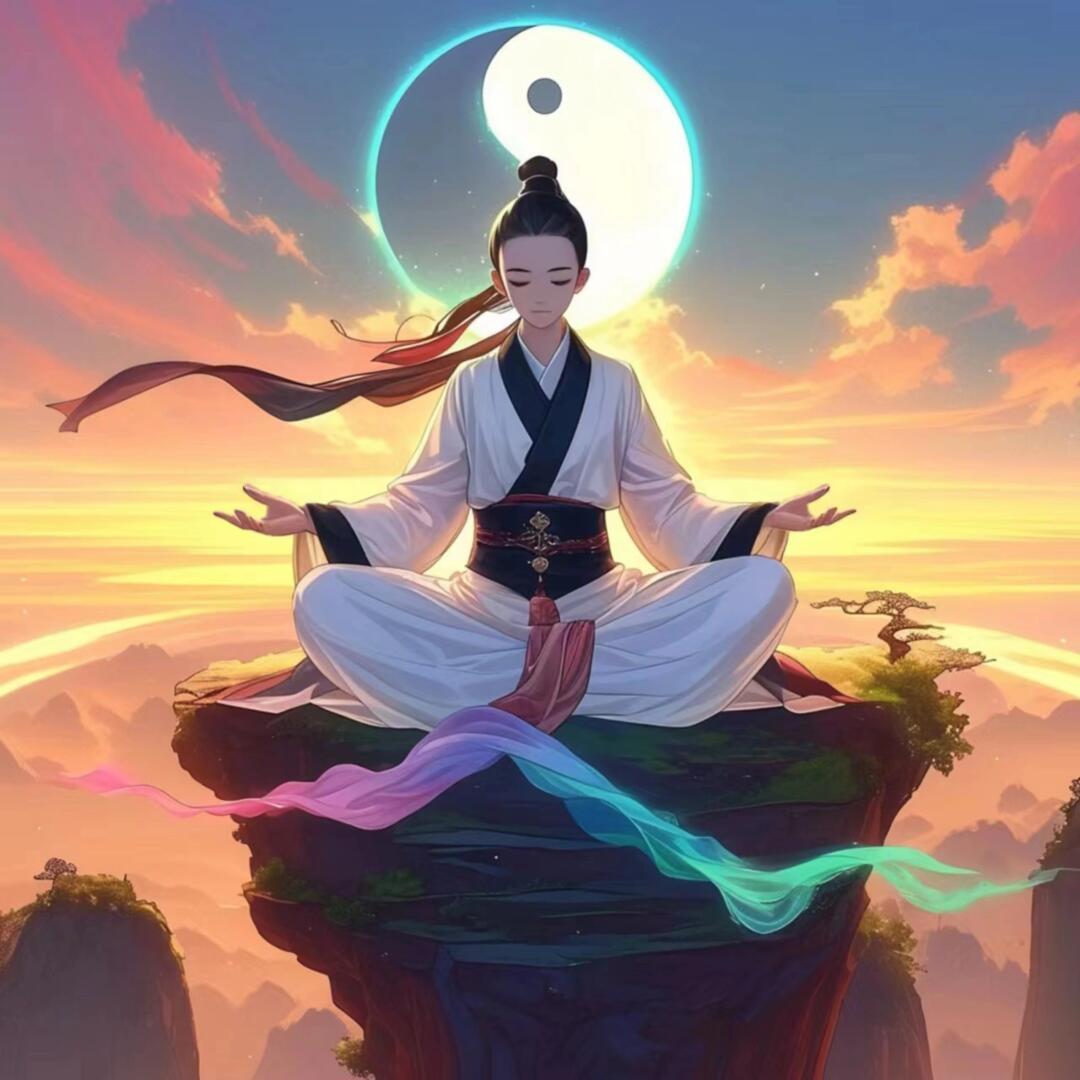In the bustling and noisy ancient towns where carriages and horses bustled about, there was a young scholar named Su Jin. He came from a scholarly family and had been immersed in books since childhood, full of lofty aspirations to put his learning into practice. However, due to his lack of worldly experience, he often felt confused and helpless when facing the complexity and variability of the real world. Wealth, to him, was like the moon in the water or the flower in the mirror, seemingly within reach but actually out of reach.
One day, while strolling along a secluded bamboo forest path in the town, Su Jin happened to meet a successful merchant named Li Yifeng, who was renowned in the local chamber of commerce. Li Yifeng was open-minded, generous, and had deep and wise eyes. Every gesture of his showed composure and self-confidence. When he saw that Su Jin had an intelligent look between his brows but also a hint of melancholy on his face, he couldn't help but feel curious.
The two had a pleasant conversation, and Su Jin poured out to Li Yifeng his confusion and setbacks in the pursuit of wealth and the realization of his ambitions. Li Yifeng smiled slightly and said earnestly, "Do you know that wealth is just like flowing water? Although we can guide it into our hands through the right ways and unremitting efforts, we mustn't be too hasty or use excessive force, and we definitely shouldn't clutch it too tightly in our palms. If you're always worried about losing it, wealth will be like a startled bird and fly away from you, never to return."
Hearing these words, Su Jin felt as if a flash of inspiration had struck his mind. It was as if he had suddenly caught sight of a bright lighthouse guiding the way forward in the thick fog. He began to carefully consider Li Yifeng's words and realized that the acquisition and accumulation of wealth were not a fierce struggle for seizing it by force but should be 顺应时势、遵循自然规律的顺势而为 (in line with the trend of the times and following the natural laws).
So, relying on his solid academic knowledge, Su Jin devoted himself to writing exquisite articles for wealthy households in the town and sorting out ancient books and records. His writing was as smooth as flowing water, and the words he penned were either magnificent or delicate and graceful. Each article could hit the mark with the employers' intentions, winning praise from everyone. Thanks to the appreciation and recommendation of these employers, he gradually emerged in the circle of literati in the town, his reputation growing day by day, and wealth also began to slowly gather around him like a trickle of water.
During this process, Su Jin always kept Li Yifeng's teachings in mind. He didn't become complacent because of the accumulation of a little wealth in front of him, nor did he try to tightly control it. He knew deeply that if wealth was to last long, it needed to maintain flexibility and a natural flow. Therefore, he maintained an excellent relationship with Li Yifeng, often visiting him to humbly ask for advice on business management and the way of dealing with people. Li Yifeng also had a high opinion of Su Jin and was generous in imparting all the valuable experience and wisdom he had accumulated over the years in the business world.
While drawing on Li Yifeng's wisdom, Su Jin could also combine what he had learned and the actual situation and apply it flexibly. He noticed that the local people's love and demand for exquisite paintings and calligraphy were increasing day by day. So, he cleverly utilized his connections and resources in the literati circle to organize a group of talented painters and calligraphers to jointly create and sell various painting and calligraphy works. This move not only met the cultural needs of the people but also brought him quite substantial profits.
As time slowly passed, Su Jin's wealth grew richer and richer, just like the converging streams forming a river. He didn't use this wealth merely for his personal material enjoyment. Instead, he actively gave back to society. He built schools to help poor students study and learn. He also constructed water conservancy projects to improve the irrigation conditions of farmland and assist the people's agricultural production. His good deeds won wide acclaim and respect from the people in the town, and his reputation and prestige also grew rapidly, bringing him more business opportunities and sources of wealth.
The Taoist thought contained herein is like the ancient stars that are profound, far-reaching, and full of endless wisdom, shining brightly in the long river of history. The concept of "Wealth is like flowing water, don't grasp it too tightly" deeply reflects Taoism's unique perception and understanding of wealth. In Taoism's view, everything in the world is in an eternal state of change and flow, and wealth is no exception. It is not a fixed and unchanging thing that people can possess forever but is like the water in nature, with its own laws and rhythms of operation.
If people try to violate this law and grasp wealth with excessive greed and obsession, regarding it as the sole symbol of their status and the whole source of their sense of security, it will be like building solid dams in the river in an attempt to stop the flow of water. At first, it may seem that wealth can be temporarily trapped in one's hands, but as time passes, the water will inevitably accumulate pressure due to the obstruction and eventually break through the dams, causing floods. Not only will the wealth accumulated before disappear in an instant, but it may also bring immeasurable disasters and losses to oneself.
On the contrary, if one can adapt to the characteristics of wealth being like flowing water, treat it with a peaceful and open-minded attitude, follow the natural laws, and act in accordance with the trend, when wealth comes, one can be grateful and use it reasonably. When wealth seems to be slipping away quietly, one can also let it go calmly without making futile struggles or attempts to hold it back. In this way, wealth can flow naturally in the river of life like a clear stream, continuously and never drying up.
Throughout history, countless examples can serve as powerful evidence of this thought. In the past, there was Fan Li, also known as Tao Zhu Gong. After helping King Goujian of Yue achieve hegemony, he deeply understood the truth that "when the birds are all gone, the good bow will be put away; when the hares are all killed, the hounds will be cooked." So, he resolutely gave up his high official positions and generous salaries and chose to retire from the political arena. He took a small amount of wealth and engaged in business operations. He wasn't greedy for wealth and didn't deliberately pursue huge profits. Instead, he adjusted his business strategies flexibly according of the changes and demands of the market. Sometimes he was engaged in the trade of goods, and sometimes he managed agricultural production. Wealth flowed as smoothly as clouds and flowing water in his hands. He not only accumulated a huge amount of wealth himself but also became the "Business Sage" respected by merchants in later generations. His concept of wealth and business operation methods were also widely praised.
Another example is Hu Xueyan, the famous "Red-Topped Merchant" in the Qing Dynasty. During the heyday of his business empire, he was as wealthy as a country. However, in the later period, due to excessive expansion of his business territory, he tried to tightly control all wealth and business resources. He even didn't hesitate to rely on official power and conduct some operations that violated business laws and moral norms. Eventually, under the dual pressures of the changing political situation and business competition, his business empire collapsed suddenly, and his once huge wealth disappeared like bubbles into thin air.
In today's modern society where changes occur in the blink of an eye, the wave of economic globalization is surging, the market environment is complex and changeable, and various emerging business models and investment opportunities emerge in an endless stream. The Taoist thought of "Wealth is like flowing water, don't grasp it too tightly" still has extremely profound implications for us on the road to pursuing wealth and realizing personal values.
We should abandon the mentality of excessive greed and eager for quick success and instant benefits. We should learn to observe market changes with a calm and rational eye and grasp the pulse of the times. In the process of investment and entrepreneurship, we should not follow the trend blindly or be stubborn. Instead, we should adjust our strategies flexibly according to the actual situation and conform to the market trend. Meanwhile, we should also establish a correct concept of wealth, realizing that wealth is not only the capital for personal enjoyment and showing off but also a tool for fulfilling social responsibilities and promoting social progress. After accumulating a certain amount of wealth, we should actively participate in public welfare undertakings, give back to society, and promote the harmonious development of society. Only in this way can we swim freely in the long river of wealth, achieve a win-win situation between personal wealth and social value, and make our fortune flow continuously like an inexhaustible spring, moistening everything around us.



